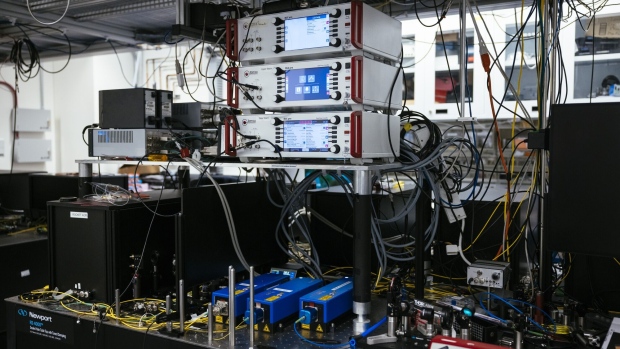Jun 18, 2024
Pritzker Taps IBM, Discover in Bid for Federal Quantum Funds
, Bloomberg News

(Bloomberg) -- Illinois Governor J.B. Pritzker has turned to a consortium that includes International Business Machines Corp. and Discover Financial Services to help win federal funds to develop quantum technology.
The companies will work together with Boston Consulting Group and P33, a nonprofit started by the governor’s sister and former Secretary of Commerce Penny Pritzker, to develop quantum tools to fight financial fraud. The plan is part of a bid to win $70 million from President Joe Biden’s Tech Hubs program established as part of the 2022 Chips and Science Act.
Governments, consumers and financial firms are currently picking up a tab of $2 trillion in money laundered every year, more than $40 billion in identity scams and $30 billion in credit card fraud, the consortium said in a white paper this month.
Winning the federal money is key to helping fund Quantum Shield, the fraud-detection project that’s part of Illinois Tech Hubs bid, said Brad Henderson, chief executive officer of P33. The effort is unique because it seeks to use quantum technology, instead of binary traditional computers, to solve a real-world problem. Quantum technology relies on “qubits” and can store data in multiple forms — ones, zeros, both, or something in between.
“Whenever I read anything on quantum computers, it’s all like qubits, qubits, qubits,” Jay Gambetta, vice president of IBM Quantum, said. “I love qubits, don’t get me wrong, but if we are going to do something that matters for the industry, we need to bring algorithms to industry-relevant proof of concepts.”
The funds will be used for proof of concept, phase 1 of the project, according to Henderson. If Quantum Shield can prove in its pilot that it can reduce fraud it will likely prevail, he said. Phase 2 would be scaling it, he said, adding that hundreds of millions of dollars would be needed for that.
The Chips and Science Act authorized $10 billion over five years for the Tech Hubs program, which aims to draw in private capital to boost science and technology manufacturing across the country. But lawmakers have only appropriated $541 million of that funding, setting up a steep competition among hundreds of applicants.
The Biden administration designated 31 hubs last year, including Illinois’ The Bloch Tech Hub, making them eligible for up to $75 million each. Funding announcements are expected this summer. Henderson of P33 expects the results in the next four weeks or so.
Tackling financial fraud is an urgent issue, with the use of AI propelling bad actors, said Rob Gillis, vice president at Discover. Since the launch of ChatGPT at the end of 2022, ransomware attacks increased 76% and phishing scams surged by over 1,000%, according to the white paper.
Preventing fraud means detecting subtle oddities in large datasets, while also trying to avoid flagging legitimate transactions.
“At times, existing classical fraud detections may not be able to detect those subtle anomalies,” Gillis said. “I think the industry is appreciating that it’s going to require new and sophisticated defenses.”
‘Natural Place’
Illinois has been trying to position itself as a hub for new technologies. Pritzker, the billionaire scion of the Hyatt hotel chain, has made quantum a priority. The governor, often mentioned among the bench of Democrats who may one day wage a White House bid, this year passed a budget that includes $500 million to position the state as a leader in semiconductors, quantum and artificial intelligence.
Matt Langione, managing director and partner at BCG, said Chicago is a “natural place” for the consortium, which also includes Mastercard, University of Chicago, Federal Bureau of Investigation and Federal Reserve Bank of Chicago. There’s the Chicago Quantum Exchange, a hub for advancing the technology, as well as strong engineering and tech programs at the University of Chicago, University of Illinois Urbana-Champaign and Northwestern University.
The third-biggest US city has one of the country’s longest quantum network — 124 miles (200 kilometers) connecting the US Department of Energy’s Argonne National Laboratory. Illinois also has four of the nation’s 10 quantum centers, the most of any state.
“Chicago has found itself in a unique position where it’s got industries that can leverage this technology,” Gambetta said.
--With assistance from Mackenzie Hawkins.
©2024 Bloomberg L.P.





